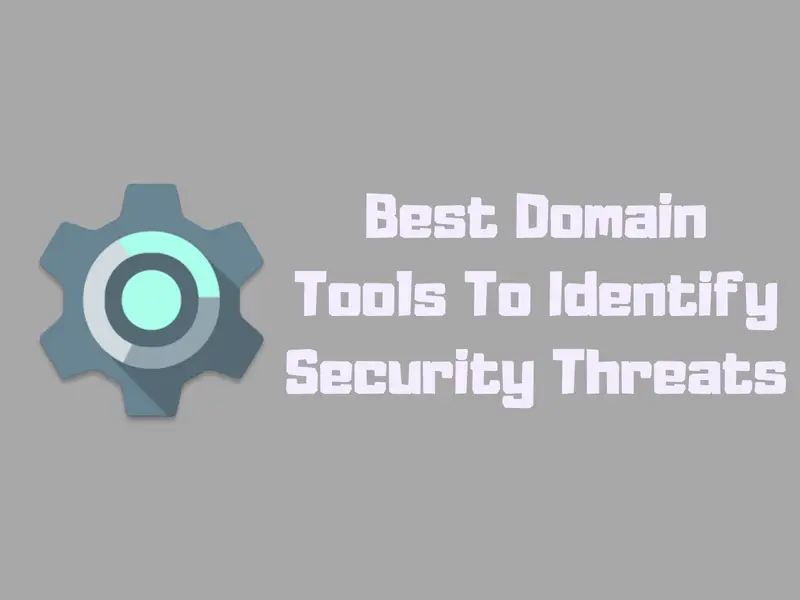Best Domain Tools To Identify Security Threats On The Website

In today’s world internet plays a key role in economic and information. But domains and hosting are the primary sources of the internet that people are looking for.
With the growing number of cyber-attacks, it is important for businesses to invest in reliable domain tools. Domain tools can help protect your business and maintain the security of your websites, apps, and social media accounts. It is important to monitor domains for fake or malicious profiles that could damage the credibility or steal vital information from unsuspecting users.
Keeping a website safe from cyberattacks is one of the most important things for any business owner or domain holder. But what are the most common security threats? How do you know if your site is secure? And how can you fix issues when they arise? This guide will answer all of these questions and more.
Many online domain tools are free to use and identify domain-related queries such as network tools, web & browser tools, security, privacy tools, etc. So we provide a list of domain tools that helps webmasters, developers, domain owners, as well as all other internet users to analyze and protect the domain.
These tools are completely independent of various websites which are free and suitable for your needs like basic domain DNS information, CName, IP address, registered date, expiry date, other parameters, etc.
This article will outline the most common threats faced by domains, their potential repercussions, and how to protect them. we will also discuss different types of domain security available using online tools, many people use domain security tools to protect their personal information and the information on their domains. We will discuss some of the different types available and what they do for you.
What are Domain Threats and their Impact?
Domain threats are the risks that come with owning a domain name. These threats may be security related or not. Domain threats can come from different sources and have different effects on the domain owner. It is important to know how to identify and mitigate these risks, in order to protect your business.
A domain threat is a form of malware that has the potential to cause damage to a computer system. The damage can range from data loss to the complete shutdown of the system. These threats are usually delivered via email or other methods, and they infect the target computer when they are opened.
A domain threat can also be an encrypted message that is sent to a specific individual or group. The message is disguised as something else, like an invoice, and it contains malware that will infect the recipient’s system when it is opened.
How can you Identify the Root Cause of your Website's Security Problem?
Domain security is a big issue in the digital world. This is because hackers are always on the lookout for new domains to exploit. To help you identify whether your domain has a security problem, we have created an easy-to-use domain security checker that can be accessed here.
Security issues with your domain can lead to a number of problems such as phishing messages, account hijacking, and more. So the root cause of a security issue can be identified by checking the domain security status. This can be done by running a domain security checker and looking for any information related to the issue.
Websites are often targeted by phishing messages that are designed to steal personal information or trick users into downloading malware. These messages usually take the form of an email, text message, or phone call that tries to convince users to enter their personal information on a fake website.
What are Domain tools and how it useful?
Domain Tools is one of the most popular tools that website owners and webmasters use to conduct a security threat assessment. It provides website owners with the opportunity to assess and monitor their site for security threats. It also provides them with information about who owns the domain, who has registered it, and the IP address of the server.
Domain tools is a simple and affordable way to scan your website for security issues. They have an extensive library of security penetration tests that are tailored to find potential threats and vulnerabilities. This can save a lot of headache and money in the long run!
Mainly a domain scanner is used for scanning the security of a website or application. This small and easy-to-use application can be used to scan a website for malware, vulnerabilities, and other possible issues. This way it makes very useful to use these tools.
Benefits of using domain tools
Domain Tools enables you to perform a domain name lookup, whois lookup, and DNS lookup. It also provides website security scanning and monitoring. It is a free service that can be used to scan your website for security threats. The scanning tools will show you if there are any vulnerabilities on your site that need to be fixed or if there are any malware infections.
Theft Identification: One of the main reasons to use domain tools to identify domain theft; means the hacker hijacks your domain and takes all the access under his control. There are 3 reasons your domain can be hijacked i.e
- DNS information is publicly available; the best option is to purchase domain privacy from your service provider.
- Not purchased from the trusted domain service provider
- This method is completely legal where your domain is expired and forgot to renew, so enable the auto-renew option in order to avoid these mistakes.
Privacy protection - In other terms, whois is the main source of domain DNS information, like name, email address, phone number, and also the purchased address. Just enter the website URL on the whois database to retrieve public information. So domain privacy is the key to protecting your identity and domain-related information.
Domain Risk analysis - There are many domain tools that help to analyze the risk score of malicious websites, blacklisted domains, nonsecure HTTPS, privacy, and security of the site. So each and every parameter are important to analyze domain risk score.
Domain Name Information - The Whois data is offered to the public for accessing the records present in the database for information purposes only. This information will help the site owner to analyze privacy and protection factors to make the site more secure.
Also, network domain tools are a kind of software program that helps to manage network administration to keep track of IP address, date, charges, and monitor other protocols.
Lists of Domains Tools to Identify Privacy and Security Issues
Whois Lookup - Whois is a domain lookup tool to identify domain owner information, IP address, hosting provider, email, phone number and other information from the whois database
Domain IP Lookup - This tool discovers IP address of any domain extension like .com, .net, .in, .org etc. Just provide domain information in the textbox, and get immediate results.
Server Status Checker - The server status checker identifies whether the hosting domain is online or offline for the user. If the server is online and not upgraded, it may get hacked in the future. The tool helps you to check up to 100 domains at a single time.
Class C IP checker - It allows users to check the class C IP of multiple websites. Class C IP addresses range from 192.0.0.x to 223.255.255.x. which means the first octet is set to 110. It helps you identify how many domains are hosted on the same IP address.
DNS Lookup Tool - This lookup tool retrieves the DNS information which is linked to the hosting. Since it is a browser-based network tool that displays DNS records like A, AAAA, CNAME, MX, NS, SOA, and TXT publically to the users which is a security threat to your domain and may lose all your valuable information.
Blacklist Lookup Tool - This is another unique tool to track check your website IP addresses or domains are blacklisted or not. Blacklisted domains can harm your traffic and leads fall in google rankings.
This is an important tool for SEO professionals, webmasters, and bloggers because it saves them time and money. The Blacklist Lookup tool provides information such as the domain name, email address, phone number, other personal information, date of blacklisting, the reason for blacklisting, Which search engine blacklisted the domain, and How long the domain is blacklisted.
Website Speed Test - Website speed is mainly used for analyzing website speed to improve search engine rankings. On many websites, the scripts may display valuable information to users unknowingly. These data can be hacked or hackers may insert new code to make website speed still slower.
MX Lookup - The MX lookup tool will list all the MX records for the domain in priority order. It is responsible for sending or receiving emails from the domain server. So make sure your site is updated with SSL security and an anti-spam filter to avoid phishing emails from unauthorized users.
Email Privacy Checker - The email privacy tool analyses any email visible on the website and alerts the user on email which is completely visible on the site. These emails can be easily extracted by hackers and send the virus files infecting your server or domain name service.
Browser Tool - The browser is the core software to search queries or information on the search engine. If the browser is not updated regularly on the new version, it may run unwanted scripts on the backend and copy each site you visit to be hacked. In order to avoid sites getting hacked, regularly update your browser with the new version. To know your browser version, just click the browser checker tool
Conclusion of Domain Tools
The conclusion of the Domain Tools To Identify Security Threats On The Website is that it is important to know what type of security threats are present on your site.
Since it is a set of tools that helps identify security threats on websites. These security threats can be anything from malware to domain hijacking, to phishing scams. Anything that can harm the website and its data can be detected by this tool. This includes things like social engineering attacks and SQL injection attacks which are both very common today.
This tool also provides a lot of information about the website such as who owns it, when it was created, what IP address it has, where it's hosted, and even much more to fight against security threats.





